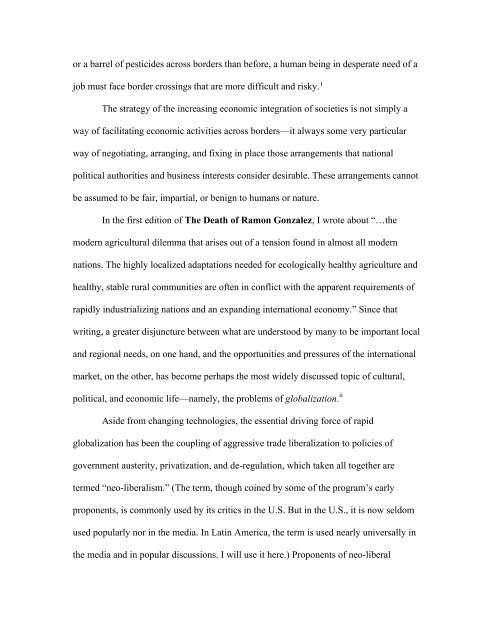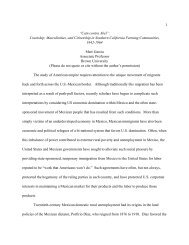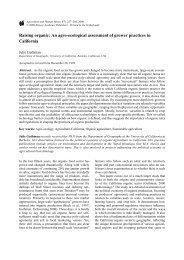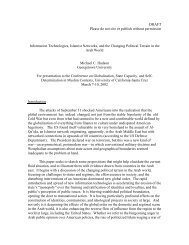The Death of Ramon Gonzalez and the 21st Century Dilemma
The Death of Ramon Gonzalez and the 21st Century Dilemma
The Death of Ramon Gonzalez and the 21st Century Dilemma
Create successful ePaper yourself
Turn your PDF publications into a flip-book with our unique Google optimized e-Paper software.
or a barrel <strong>of</strong> pesticides across borders than before, a human being in desperate need <strong>of</strong> a<br />
job must face border crossings that are more difficult <strong>and</strong> risky. i<br />
<strong>The</strong> strategy <strong>of</strong> <strong>the</strong> increasing economic integration <strong>of</strong> societies is not simply a<br />
way <strong>of</strong> facilitating economic activities across borders—it always some very particular<br />
way <strong>of</strong> negotiating, arranging, <strong>and</strong> fixing in place those arrangements that national<br />
political authorities <strong>and</strong> business interests consider desirable. <strong>The</strong>se arrangements cannot<br />
be assumed to be fair, impartial, or benign to humans or nature.<br />
In <strong>the</strong> first edition <strong>of</strong> <strong>The</strong> <strong>Death</strong> <strong>of</strong> <strong>Ramon</strong> <strong>Gonzalez</strong>, I wrote about “…<strong>the</strong><br />
modern agricultural dilemma that arises out <strong>of</strong> a tension found in almost all modern<br />
nations. <strong>The</strong> highly localized adaptations needed for ecologically healthy agriculture <strong>and</strong><br />
healthy, stable rural communities are <strong>of</strong>ten in conflict with <strong>the</strong> apparent requirements <strong>of</strong><br />
rapidly industrializing nations <strong>and</strong> an exp<strong>and</strong>ing international economy.” Since that<br />
writing, a greater disjuncture between what are understood by many to be important local<br />
<strong>and</strong> regional needs, on one h<strong>and</strong>, <strong>and</strong> <strong>the</strong> opportunities <strong>and</strong> pressures <strong>of</strong> <strong>the</strong> international<br />
market, on <strong>the</strong> o<strong>the</strong>r, has become perhaps <strong>the</strong> most widely discussed topic <strong>of</strong> cultural,<br />
political, <strong>and</strong> economic life—namely, <strong>the</strong> problems <strong>of</strong> globalization. ii<br />
Aside from changing technologies, <strong>the</strong> essential driving force <strong>of</strong> rapid<br />
globalization has been <strong>the</strong> coupling <strong>of</strong> aggressive trade liberalization to policies <strong>of</strong><br />
government austerity, privatization, <strong>and</strong> de-regulation, which taken all toge<strong>the</strong>r are<br />
termed “neo-liberalism.” (<strong>The</strong> term, though coined by some <strong>of</strong> <strong>the</strong> program’s early<br />
proponents, is commonly used by its critics in <strong>the</strong> U.S. But in <strong>the</strong> U.S., it is now seldom<br />
used popularly nor in <strong>the</strong> media. In Latin America, <strong>the</strong> term is used nearly universally in<br />
<strong>the</strong> media <strong>and</strong> in popular discussions. I will use it here.) Proponents <strong>of</strong> neo-liberal





